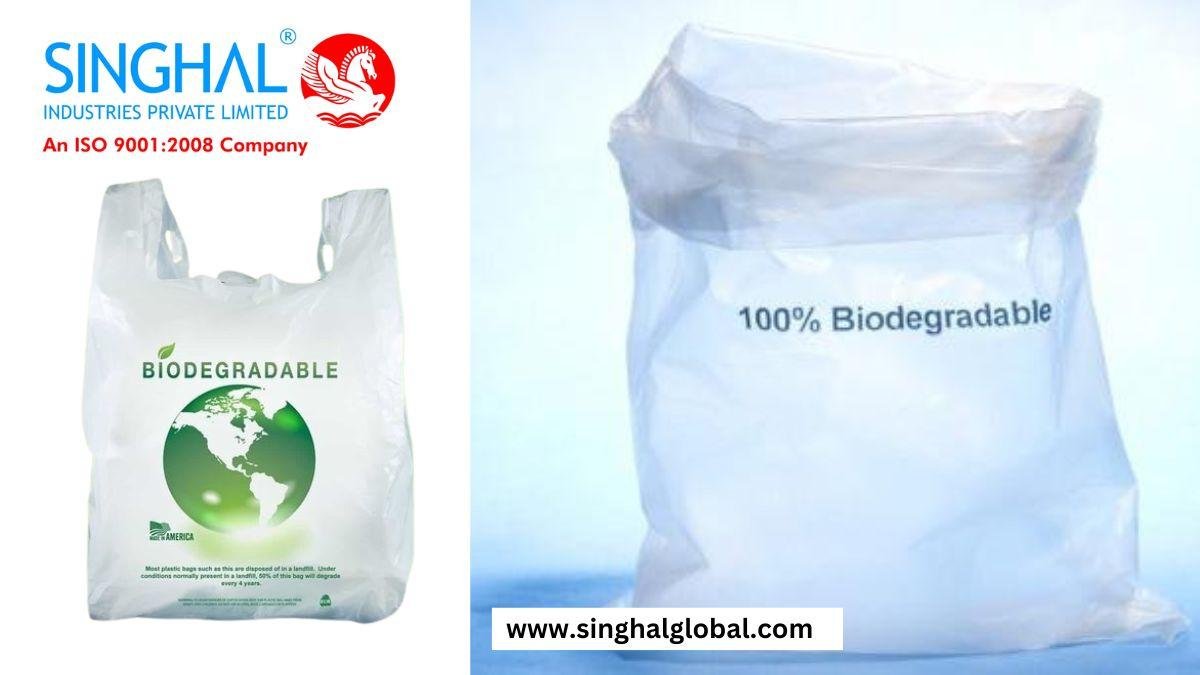In recent years, there has been a significant shift toward more sustainable and eco-friendly alternatives to conventional plastic. Among these alternatives, biodegradable plastic bags have emerged as a leading solution to combat plastic pollution. These bags offer a promising alternative to traditional plastic bags, which take hundreds of years to decompose. Biodegradable plastic bags are designed to break down more quickly and safely, reducing environmental harm. In this article, we will explore what biodegradable plastic bags are, their benefits, applications, and why it’s essential to source them from reputable biodegradable plastic bags manufacturers in India and biodegradable polybag exporters in Ahmedabad.
What Are Biodegradable Plastic Bags?
Biodegradable plastic bags are made from renewable resources such as starch, plant-based polymers, or other biodegradable materials. Unlike conventional plastic bags, which are derived from petroleum, biodegradable plastic bags are designed to break down more rapidly when exposed to environmental conditions like heat, moisture, and sunlight.
These bags decompose through microbial activity, meaning microorganisms in the soil or water help break them down into harmless substances like water, carbon dioxide, and biomass. This process occurs much faster than traditional plastic, which can persist in the environment for centuries.
Biodegradable plastic bags can be made from several different materials, including:
- Cornstarch-based plastics
- Polyhydroxyalkanoates (PHA)
- Polylactic acid (PLA)
- Biodegradable polyethylene
Benefits of Biodegradable Plastic Bags
-
Eco-Friendly and Sustainable: One of the most significant advantages of biodegradable plastic bags is that they are more environmentally friendly than traditional plastic bags. They break down much faster, reducing the environmental impact of plastic waste. When disposed of properly, these bags leave no toxic residues behind.
-
Reduction in Plastic Pollution: Plastic bags are a major source of pollution, especially in oceans and water bodies. They pose a serious threat to marine life, as animals often mistake them for food. Biodegradable plastic bags reduce this threat, as they break down into safe, non-toxic components.
-
Conserve Non-Renewable Resources: Biodegradable plastic bags are often made from renewable resources such as corn or sugarcane, which helps reduce the dependence on fossil fuels. This shift to plant-based materials also reduces carbon emissions associated with petroleum-based plastics.
-
Compostability: Many biodegradable plastic bags are compostable, meaning they can be converted into nutrient-rich compost when properly disposed of in composting facilities. This provides an additional environmental benefit by turning waste into a resource for agriculture and gardening.
-
Regulation Compliance: As governments around the world implement stricter regulations to reduce plastic waste, biodegradable plastic bags offer a viable solution to comply with these regulations. Many regions are banning single-use plastic bags, making biodegradable bags an attractive alternative for businesses and consumers alike.
Applications of Biodegradable Plastic Bags
Biodegradable plastic bags have various applications across multiple industries. Some of the most common uses include:
-
Retail and Packaging: Biodegradable plastic bags are increasingly used by retail stores as an eco-friendly alternative to traditional plastic bags. They are ideal for carrying groceries, clothes, and other retail products while providing a sustainable solution for consumers.
-
Food Packaging: Many biodegradable bags are used in food packaging, as they do not contain harmful chemicals that could leach into food products. They are ideal for packaging fruits, vegetables, and baked goods, as they provide an environmentally friendly solution for food storage.
-
Trash Bags: Many biodegradable bags are used as trash bags for households and businesses. These bags decompose in landfills, reducing the environmental footprint of waste disposal.
-
Agriculture: In the agricultural sector, biodegradable plastic bags are used for purposes such as packaging seeds, fertilizers, and plant products. They help reduce the environmental impact of packaging waste in farming and gardening.
-
Medical and Healthcare: Biodegradable plastic bags are also used in medical and healthcare settings for packaging medical waste and supplies. These bags decompose more quickly than traditional plastic bags, minimizing the environmental impact of medical waste disposal.
Choosing the Right Supplier for Biodegradable Plastic Bags
When looking for high-quality biodegradable plastic bags, it’s essential to choose a reliable supplier. Whether you’re sourcing for retail, packaging, or agricultural purposes, working with a trusted biodegradable plastic bags manufacturer in India or degradable plastic bags supplier in Ahmedabad ensures you’re getting a product that meets industry standards.
-
Quality Assurance: A reputable Biodegradable plastic bags manufacturer in India will adhere to strict quality control processes to ensure that the bags are durable, functional, and truly biodegradable. Make sure the supplier offers transparent information about their product specifications and the materials used.
-
Customization: Different industries and businesses have unique requirements for their biodegradable bags. Whether you need specific sizes, designs, or logos, working with an experienced manufacturer allows you to customize your biodegradable bags to suit your needs.
-
Compliance with Regulations: Ensure that the supplier you choose complies with local and international regulations regarding biodegradable materials. Many regions have strict guidelines regarding biodegradable products, and it's important to work with Biodegradable polybag exporters in Ahmedabad who are well-versed in these standards.
-
Pricing and Availability: Cost is always a key factor in decision-making. While biodegradable plastic bags may be slightly more expensive than traditional plastic, the long-term environmental and regulatory benefits make them a cost-effective choice. Choose a supplier who offers competitive pricing without compromising on quality.
-
Customer Service and Delivery: A reliable Degradable plastic bags supplier in Ahmedabad should offer excellent customer service, providing timely delivery and addressing any concerns or issues you might have. Look for suppliers who are responsive and committed to delivering the best service.
Summary
Biodegradable plastic bags offer a sustainable and eco-friendly alternative to traditional plastic bags, which are notorious for their environmental impact. With benefits such as faster decomposition, reduced pollution, and the use of renewable resources, biodegradable bags are becoming a preferred choice in various industries. By sourcing biodegradable plastic bags from a reputable biodegradable plastic bags manufacturer in India or degradable plastic bags supplier in Ahmedabad, businesses can contribute to reducing plastic waste while adhering to environmental regulations. With increasing demand for eco-friendly solutions, biodegradable plastic bags are leading the way toward a cleaner and greener future.
FAQs
-
What makes biodegradable plastic bags different from regular plastic bags?
Biodegradable plastic bags are designed to break down more quickly than regular plastic bags, which can take hundreds of years to decompose. They are made from plant-based materials or other biodegradable substances, which means they are less harmful to the environment and decompose into non-toxic compounds. -
Are biodegradable plastic bags safe for food packaging?
Yes, many biodegradable plastic bags are safe for food packaging. They are often made from non-toxic, plant-based materials like cornstarch or PLA, ensuring they do not leach harmful chemicals into food. Always ensure that the bags are certified food-safe before use. -
How long do biodegradable plastic bags take to decompose?
The decomposition time for biodegradable plastic bags depends on the material used and environmental conditions. On average, biodegradable plastic bags take between 3 to 6 months to break down in a composting environment. In landfill conditions, they may take longer, but they still degrade faster than conventional plastic bags.

